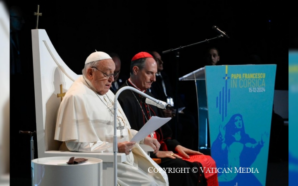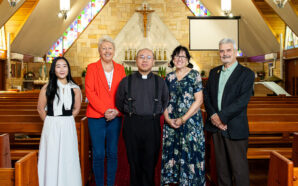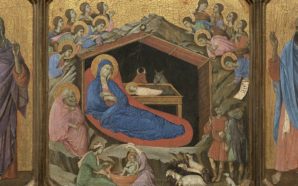Homily for the 13th Sunday in Ordinary Time
30 June 2024
Readings: Wisdom 1:13-15; 2:23-24; Psalm 30; 2 Corinthians 7, 9, 13-15; Mark 5:21-43
What’s it really mean to have faith? And does it make any real difference? We all try to live a good life. We all try to control for the best those things we can control. We all seek the equanimity to live with those things we can’t control. We all try to change what’s bad in the world around us as best we can. But there is only so much we can do. There’s only so much we can change. The rest is out of our hands – regardless of whether or not we have faith in Jesus of Nazareth. Even those of us who take our Christianity seriously need to accept that there is only so much we can do to put the world right. As Paul tells the Corinthians in today’s second reading: ‘This does not mean that to give relief to others you ought to make things difficult for yourselves: it is a question of balancing what happens to be your surplus now against their present need, and one day they may have something to spare that will supply your own need.’ As a religious sister who dedicated her life to the poor once warned me, ‘Sometimes you have to step over the beggar at the door.’ Many alcoholics pray daily the Serenity Prayer originally formulated by Reinhold Niebuhr in 1943: ‘God grant me the serenity to accept the things I cannot change, the courage to change the things I can and the wisdom to know the difference.’
Listen at https://soundcloud.com/frank-brennan-6/homily-30624
In last week’s gospel Jesus confronted the disciples in the boat: ‘Why are you terrified? Do you not yet have faith?’ Jesus then confronts the man who is possessed by demons, driving out the demons, and telling the man: ‘Go home to your people and tell them what the Lord in his mercy has done for you.’ In this week’s gospel we encounter two people who are desperate, two people who place complete faith in Jesus, having exhausted all other avenues of help. Then after these two encounters the gospel moves on with Jesus returning to Nazareth, his birthplace, where he could not work any miracles. Why? Because the locals do not have faith. ‘He was amazed at their lack of faith.’
The faith of which Mark speaks opens the door to Jesus being able to transform lives and being able to restore life and give life. The first encounter in today’s gospel is between Jesus and Jairus, the synagogue official whose 12-year-old daughter is dying. The second encounter is between Jesus and the woman who has been suffering severe haemorrhaging for 12 years. In both encounters, Jesus comes face to face with people who are desperate. They’ve tried everything. There is nowhere else to go.
During the first encounter people from Jairus’s house arrive and say, ‘Your daughter has died; why trouble the teacher any longer?’ Jesus says to Jairus, ‘Do not be afraid; just have faith.’ During the second encounter, Jesus says to the unnamed woman: ‘Daughter, your faith has saved you. Go in peace and be cured of your affliction.’ Scripture scholars John R. Donahue and Daniel J. Harrington tell us: ‘In these two narratives Jesus not only rescues the two women from death but also restores to them their life-giving capacity. Both can bring forth life from their bodies, one once racked with disease, the other deprived of life itself.’[1] Donahue and Harrington declare that ‘Faith is ultimately the trust that contact with the power of God manifest in the teaching and actions of Jesus is victory over sickness and death’.[2]
None of us expects our faith ultimately to save us from death. None of us routinely expects our faith to cure our ailments or relieve the woes of the world. So what difference does faith really make? Even though we walk through the valley of death, even though we suffer illness, even though there is evil in the world that we cannot change, we maintain our hope of life eternal; we maintain our hope of a kingdom to come when justice and peace will prevail. Such a splendid horizon gives new meaning and new hope to us in the situation in which we find ourselves no matter how limiting and distressing it may be.
When Julian Assange landed back home in Australia on Thursday night after 14 years in detention, his wife Stella said, ‘He’s overjoyed to be back home. He’s just marvelling at the horizon.’ Imagine having spent 14 years locked up, never having seen the horizon. Jesus proclaiming the kingdom to come provides us with an horizon that offers hope and new life regardless of the despair and even death that we will inevitably endure. With faith, we can always see that horizon no matter what the darkness in which we find ourselves and our world.
When all avenues are exhausted as they were for Jairus and as they were for the woman with the haemorrhage, there is the prospect of a new horizon pointing the way to life and hope, despite death, suffering and evil. This is our faith.
If we have faith, Jesus can accompany us and transform our lives with hope whether in the midst of natural disaster as with the disciples confronting the wind and storm on the lake, in the midst of evil as with the man possessed by demons, in the midst of illness as with the woman suffering a haemorrhage, and even in the midst of death as with Jairus’ daughter. With this horizon of faith, we can always forgive again, love again and hope again whatever the limitations of our world, whatever the deficiencies in ourselves.
From the start of 2024, Fr Frank Brennan SJ will serve as part of a Jesuit team of priests working within a new configuration of the Toowong, St Lucia and Indooroopilly parishes in the Archdiocese of Brisbane. Frank Brennan SJ is a former CEO of Catholic Social Services Australia (CSSA). Fr Frank’s latest book is An Indigenous Voice to Parliament: Considering a Constitutional Bridge, Garratt Publishing, 2023 and his forthcoming book is ‘Lessons from Our Failure to Build a Constitutional Bridge in the 2023 Referendum’ (Connor Court, 2024).
[1] John R. Donahue and Daniel J. Harrington, The Gospel of Mark, Sacra Pagina Series (Collegeville, MN: The Liturgical Press, 2002), p. 181.
[2] Ibid, p. 182.








